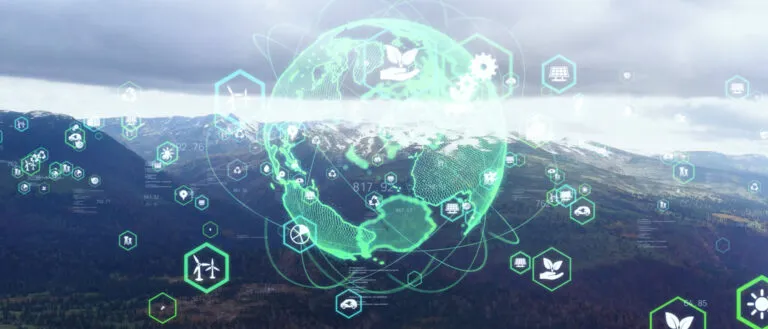What is Sustainable Leadership and its Role in Shaping a Bright Future?

- What is Sustainable Leadership?
- Importance of Sustainable Leadership
- Sustainable Leadership Examples
- What are the Characteristics of Sustainable Leadership?
- What Role do the Leaders at the Top of Organizations Play in Shaping a Sustainable Future?
- What Can We do to Make the Role of Leaders More Sustainable?
- Become a Sustainable Leader with Emeritus
According to the 2021 EY Global Institutional Investor Survey Report, 74% of investors divest from companies with poor sustainability performance. Therefore, businesses now need a new type of leadership—one that makes our planet’s long-term sustainability a top priority. In order to solve grave environmental concerns related to nonrenewable energy use, climate change, and greenhouse gas mitigation, among so many other issues, leaders from all disciplines must collaborate to change company culture, develop long-term solutions, and think creatively. Consequently, to promote sustainable leadership across various sectors, top executives need to acquire new skills and competencies.
So, what does a sustainability leader look like in practice? Read on to find out more about how to become a sustainable leader.
What is Sustainable Leadership?
Sustainable leadership is a management approach that provides solutions for environmental, social, and economic challenges in the world. It acknowledges leadership as an influence process and deconstructs silos to make leaders work collaboratively for change and transformation.
Sustainable leaders understand and embrace the growing complexity of the world, which makes them more adaptable. Most significantly, they are long-term thinkers who see people and the environment to be integral parts of the business. Guided by strong values, they undertake bold steps that prioritize the organization’s impact on future generations and not just the current quarter. With these qualities embedded in their management approach, sustainable leaders prepare the organization for success and growth.
Importance of Sustainable Leadership
According to the Value Reporting Foundation, 68 out of 77 industries are already suffering the negative consequences of climate change. It is not hard to predict that environmental catastrophes will keep upsetting the world’s supply networks and obstruct access to food and energy if organizations do not employ sustainable leadership in their business operations.
Moreover, sustainable leadership is also important as businesses that respect sustainability are increasingly attracting top talent and customers. On the other hand, businesses that don’t take reasonable action to meet sustainability goals are falling behind. Therefore, organizations must build new modes of operation that support the interdependent systems of business, humanity, and the global environment by cultivating decision-makers who share the qualities of sustainable leaders.
ALSO READ: What is Leadership? Definition, Meaning and Importance
Sustainable Leadership Examples
AeroFarms Mission to Transform Agriculture with People and Planet in Mind
David Rosenberg, CEO of AeroFarms, announced their bold mission to transform agricultural practices keeping both people and the planet in mind. The New Jersey-based company uses the latest technology in vertical farming and plant biology to repair the broken food system and improve ways to cultivate and distribute fresh produce. Currently, AeroFarms’ business model meets 12 out of 17 United Nations (UN) Sustainable Development Goals (SDGs) and won the Global SDG Awards in 2021 celebrating private sector initiatives in the advancement of the UN 2030 Agenda.
Wander+Ivy’s Attempt to Reduce Plastic Waste
Dana Spaulding, founder of Denver-based Wander+Ivy, addressed the problem of wine waste, which is an estimated $1.3 billion dollar issue worldwide. By partnering with sustainable wine producers who use certified organic grapes packaged in attractive and reusable glass bottles, the company ensures wine lovers can enjoy a glass of wine without having to compromise on quality and sustainability.
 Sustainable Leadership Principles
Sustainable Leadership Principles
Sustainable leaders strive to drive a positive change by building sustainable enterprises that reduce the impact of operations on the natural environment. To achieve this objective, they should work toward implementing the following five principles of sustainability leadership:
1. Having an Ecocentric, Systemic, and Long-Term Mindset
An ecocentric (or ecological) mindset underlines the fact that humans are a component of the global ecosystem and not separate from it. Top leaders should inspire emerging professionals to incorporate this insight into their worldview to reduce the negative impact that people have on the environment.
2. Establishing a Cross-Boundary Leadership Network
Sustainability leaders establish a cross-boundary leadership network by collaborating with leaders in different roles. Project executives, thought leaders, subject-matter experts, and trusted advisers may all be part of this leadership group. By coordinating action points, strengthening connections, and transforming key strategies into actions that appeal to various stakeholder groups, sustainable leaders create a shared vision for achieving change.
3. Exercising Influence Without Authority
The key to sustainable leadership is influence, not authority. Sustainability leaders need to exercise their influence across the world to vast, diverse groups of people, among whom they might not have any authority. Therefore, leaders must develop credible power by strategically engaging in social networking to build a relationship with employees and exercise influence without having any formal authority.
4. Working with Complexity
There is rarely a defined consensus on how to address organizational challenges. Hence, a core skill for leaders include distinguishing between various leadership types and selecting the appropriate leadership style to resolve problems, depending on the nature of the challenge. Thus, sustainability leaders must be comfortable working with various complexities that involve factors such as stakeholder needs, politics, competing interests, and natural systems.
5. Recognizing the Importance of Leading Oneself
Prioritizing self-leadership by increasing self-awareness of sustainable values and purpose is a fundamental component of sustainable leadership development. Sustainability leaders who understand the importance of first leading themselves have a clear sense of the aforementioned purpose and values and are strongly driven to encourage others to discover theirs.
ALSO READ: Here’s an Insight Into Leadership and Its Different Types
What are the Characteristics of Sustainable Leadership?
It is important to understand the key characteristics of sustainable leaders as distinct from other more established leadership styles. To make the difference clear, we have broken down the following characteristics into five main areas:
1. Sustainability Mindset
This implies a strong sense of purpose paired with a long-term orientation and an inherent ambition to achieve the sustainability bottom line.
2. Systems Thinking
Systems thinking involves the intellectual ability to observe and focus on the bigger environmental issue. It also requires changing the perspective between conflicting groups by developing a strategy that inspires all stakeholders.
3. Relationship Building
Sustainable leaders should understand people across different cultures, supporting diversity, and building productive, long-lasting relationships with stakeholders.
4. Continuity of Commitment
This means understanding that most complex challenges require long-term, adaptive management and being committed to foster change.
5. Effective Communication
Sustainable leadership requires advanced skills in active listening, storytelling, creating a shared vision, conflict management, and the capacity to motivate and convince other people.
What Role do the Leaders at the Top of Organizations Play in Shaping a Sustainable Future?
Senior leaders influence the culture of the organization through their own actions and the way they collaborate with other people. They set the tone by prioritizing sustainability leadership in their strategy and core beliefs. They develop self-awareness and analyze their own relationship with the current social, economic, and environmental issues.
Additionally, sustainability leaders evaluate how their present organizational strategy contributes to a net positive impact on the world. They consider the changes they can make to contribute in a more sustainable way over time. Therefore, senior leaders play the role of facilitator to foster a collaborative environment for their team members, stakeholders, and clients in order to shape a sustainable future.
What Can We do to Make the Role of Leaders More Sustainable?
In order to make the role of a head more sustainable, there are several strategies that can be implemented. One crucial aspect is fostering a positive work environment. Encouraging open communication and collaboration among team members helps create a supportive culture that values diversity, inclusivity, and mutual respect. Prioritizing employee well-being and work-life balance is also essential, as it promotes a healthy and sustainable approach to leadership. Developing leadership skills is another key factor.
Investing in continuous learning and development opportunities enables heads to enhance their emotional intelligence, adaptability, and effective communication skills. Seeking feedback and providing mentorship programs further nurtures growth and sustainability. Additionally, delegating tasks and empowering team members fosters trust, autonomy, and ownership within the team. By integrating sustainable practices into the organization’s strategy, operations, and decision-making processes, heads can lead by example and prioritize ethical business practices and corporate social responsibility. By modeling sustainable behavior, demonstrating integrity, and fostering a culture of continuous improvement and learning, heads can inspire their teams to embrace sustainability and drive positive change within their organizations.
Become a Sustainable Leader with Emeritus
Several brands and large corporations are steadily embracing corporate sustainability strategies. There couldn’t be a better time for aspiring leaders to master crucial skills and fight for the preservation of the world for a better tomorrow.
A great way to get started on this journey is with one of the wide range of online leadership courses by Emeritus, offered in association with globally renowned universities. These programs deliver key leadership skills. And place strong importance on sustainability to nurture positive transformative leaders who think beyond profits.
Write to us at content@emeritus.org
















